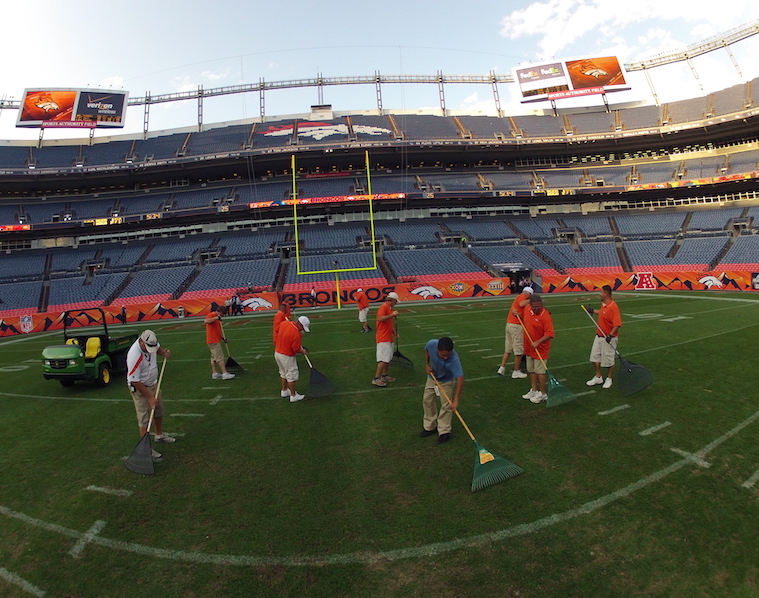In this edition of The SportsField Management Interview, we meet Ross Kurcab, CSFM, owner of Championship Sports Turf Systems. Kurcab spent 30 years as head field manager for the Denver Broncos Football Club, and is an award-winning sports field manager, sports field and turfgrass consultant, speaker, author, and columnist. He is a proud alumnus of Colorado State University’s landscape horticulture/turfgrass management program. He can be followed on Twitter @NaturalGrassMan.
SportsField Management (SFM): Please tell us about Championship Sports Turf Systems, LLC.
Kurcab: CSTS is my way of creating purpose with the skills and knowledge I developed during my time in professional football, and to create my own job that will better suit me into and through retirement. I’ll always enjoy working with professional sports teams and leagues; but now I can be of service to many more youth and amateur athletes, and help field managers who have fewer resources. That feels very fulfilling. I also wanted to find out what weekends and holidays are like.
SFM: What originally attracted you to the turfgrass industry?
Kurcab: A drifting horticulture student met Dr. Jackie Butler at CSU on advice from a friend. He gave me a rudder. He showed me that turfgrass management is not just for lawns that look good. He showed me how turfgrass is the preferred surface for almost every outdoor team sport, and how I can contribute to the health and wellbeing of people through sports field management and golf course management. Having worked hard landscaping jobs to pay for school, I envisioned a life of driving in a shaded golf cart around a beautiful course, with a glass of lemonade in my hand, telling others what to do. Things didn’t exactly work out like that, but I am eternally grateful for that meeting. Passion inspires passion.
SFM: You have earned a lot of industry recognition and awards during your career. What would you say are the biggest accomplishments of your career and/or what are you most proud to have achieved?
Kurcab: My “coaching tree” is my favorite accomplishment. Watching my former assistants and technicians successfully advancing their careers on their own just makes me smile. This list includes some amazingly talented field managers like Troy Smith, CSFM; Brooks Dodson; Abby McNeal, CSFM; Cody Freeman; Andrew Hoiberg; Chris Hathaway; and Abe Picaso. I also consider my friend Sarah Martin, CSFM, on that list as well.
In 30 years, I had exactly two workers comp injuries on my team – none very serious. While it’s never perfect, no one ever left my turf team on bad terms with me or the other team members.
I’ve always championed the cause for more women in our profession. My friend Lynda Wightman instilled this in me early in my career. She sets an amazing example for women to follow. There is absolutely no good reason why women don’t represent half of all sports field managers. It’s just cultural bias. We, as an industry, are only tapping half of our talent base! We will never get to where we want to go until we address this.

SFM: You were the first sports field manager ever to achieve CSFM status. What did that mean to you, and what advice do you have for other sports field managers regarding the value of the CSFM certification?
Kurcab: Being the first Certified Sports Field Manager wasn’t my goal. Back in the ‘90s, some of us were pushing for a certification program to grow the professionalism of our industry. After two years of committee work, we actually came up with a great program that has passed the test of time. We planned to announce the new CSFM program at the January 2000 STMA conference. I offered myself up to the committee to go through the entire process as a test run, using a proctored test so that we might identify any issues before launch. Dale Getz, CSFM, and I were the only two committee members with enough qualification points to sit for the test that was written by the academics on the committee. It quickly turned into a friendly race between Dale and I to study up and become the first ever CSFM; to be recognized in front of the entire audience at the general assembly. Due to a snafu with his proctor, I edged out Dale by a couple of weeks. Pure luck, and, to this day, when I see Dale working the Super Bowl fields, I remind him that he’s #2!
I could write a book on all the advantages my CSFM designation has given to me during the last 20 years, but it’s all right there on the STMA’s web page. I would just say to anyone considering it: Try to find anyone who has gone through the process, passed the test, and says that it was not worth it. It’s a great template for your career growth, and more than worth it!
SFM: What are the biggest challenges you have faced in your career, and what advice do you have for other sports field managers when it comes to facing similar challenges?
Kurcab: What I call “Turfism” – the cultural bias that views the sports field manager as an unskilled, uneducated “worker,” the groundskeeper. Try to find any piece of popular culture (movies, books, etc.) that does not reinforce this bias. I never liked that term “groundskeeper,” and never used it on myself. I’ve never kept any ground. I am a highly qualified professional sports field manager. My advice to others that experience this discrimination is to drop any notion of victimhood, and pick up the pace. Set your standards higher than your organizational standards. Build your education, body of work and skills to where you are seen as a professional. Refer to yourself as a professional, and behave like one. An old friend once told me, “Act like a doormat, and people will treat you like one.” Act like a professional, and people will treat you like one as well.

SFM: 2020 presented a unique set of challenges for everyone. What has the past year been like for you, and what can be learned from dealing with unprecedented times such as these?
Kurcab: Travel is part of my work, and the COVID pandemic pretty much eliminated that for 2020. But we’ve now learned that a lot of business travel is just unnecessary and wasteful. I can conduct a high-quality remote site visit on many projects and even conduct field inspections and testing remotely in some situations. Face-to-face is great – it’s what I prefer, and so do others – but I’m not there to hold your hand. My clients hire me for solutions, information, understanding and credibility – not my physical presence. Many more business meetings can, and should, be done via platforms like Zoom. It saves my clients a lot of money. I saved a client $10K in a 1-hour zoom call, and they were more than happy to send me a check. Speaking at conferences and seminars has also become much more efficient. To come speak at your conference used to cost me three days of work with no income. Now I can do it in an hour and the conference doesn’t pay travel, hotel and meals. To the extent people can get their arms around this change, it has really opened up new opportunities.
Many budgets were frozen, some through 2021. It’s been so inspiring to see the creative ways that sports field managers around the world adapted to this major disruption. Many took a financial haircut, but marched on. Amateur sports, where I love to work, basically fell off the table, but is now coming back online quickly.
I learned perspective. What is really important in your life? I learned mental health care has to be a priority, not just a notion, for us all. I learned that tough times never last, but tough people do.
SFM: How has STMA benefitted you during your career, and what is your advice to other sports field managers when it comes to the importance of service to, and involvement in, the industry?
Kurcab: I worked about 10 years as a professional field manager before we had the Sports Turf Managers Association. It was a lonely, barren existence, professionally speaking. I figure I have made about 1,500 or more new friends through the STMA over the years. The STMA membership, with its culture of open-book sharing of information, has been my best professional resource. I have thousands of friends that I can call anytime and pick their brains, and they can do the same with me. What confidence this brings. Such a welcoming group!
Definitely get involved in the STMA on the national and chapter levels. Just offer yourself up to a committee, and you won’t have to be elected in – unless you want to sit on the board. You’ll connect and create relationships with the movers and shakers in the industry. Getting involved with the STMA will create your own professional legacy. Do it.
SFM: How do you think the profession and industry will change in the next 10 years, and what would you most like to see in terms of industry advancement in the future?
Kurcab: Water. Both the quantity and quality of fresh water will become perhaps the most critical issue moving forward. The sports field manager’s role as environmental steward will only increase. Field quality standards will only grow. What is a good surface today will not be acceptable in the years ahead – a thankfully continuing trend. Automation will grow, and technical advances will continue on the fast track. We will always be an information-driven industry. Our national love of sports mean’s there’s always work for a talented sports field manager.
I’d like to see a major growth in female field managers, more outreach to teach girls that this is a great lifestyle completely within your means. I’d like to see horticulture and turfgrass science included in the concept of S.T.E.M curriculums, where it belongs. I want to see our great university turfgrass programs flooded with young students in a well-coordinated outreach program into schools. In my experiences, once a young person sees the real deal of sports field management, they want in. I’d like to see more and more field managers gaining the self-care skills to manage the stress and create happiness in their work and lives. We are in the business of fun – act like it and be joyful! If you have to work 80 hours/week to get a professional job done, something is out of balance. Take your job seriously, but not yourself. I speak from experience.



